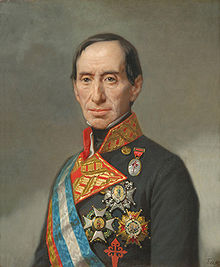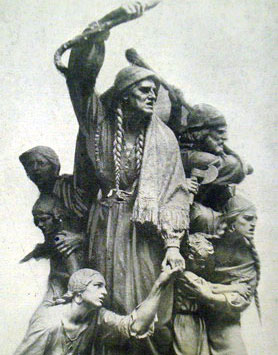Unlike other countries where Mother’s Day is celebrated in May because it is the month of the Virgin Mary and the day the mother of a US teacher died, in Bolivia this event is officially established as the 27th of May for unusual historic reasons.
May 27, 1812 is commemorated as the day the brave Heroines of Coronilla (Cochabamba) who were willing to die opposed the royal Spanish troops.
 That year the Spanish General Goyeneche was marching to Argentina at the head of his troops to invade the land and suppress the revolution that had arisen there. En route, he discovered that there was another revolution led by Esteban Arze that rose from the ashes in Cochabamba, so he turned back to fight it.
That year the Spanish General Goyeneche was marching to Argentina at the head of his troops to invade the land and suppress the revolution that had arisen there. En route, he discovered that there was another revolution led by Esteban Arze that rose from the ashes in Cochabamba, so he turned back to fight it.
The husbands were on others fights, so the women decided to organize and arm themselves to protect their children, and they launched an unequal combat against the Spaniards. Therefore, they scaled San Sebastian Hill (the Coronilla) with the rallying cry of “Our home is sacred,” carrying the image of the Virgin of Mercy. They hoped to block the troops, but were basically massacred. Three days later the city was completely occupied by the Spaniards.
All this took place on the eve of Corpus Christi (Festival of the Holy Sacrament), and the day after the massacre, Goyeneche conducted liturgical ceremonies as if nothing had happened. Taking advantage of the firecrackers and fireworks to cover up the noise of the bullets, he shot the former, patriotic governor, Mariano Antezana, and everyone he suspected of collaborating with the revolutionaries.
For more than a century this date of Christian faith was remembered as the “Sorrowful Festival of God.”
| On November 8, 1927, to commemorate the courage of the heroines of the Coronilla, May 27th was officially established as Mother’s Day in Bolivia. The law also requires that all schools and educational establishments pay homage to mothers on that date. |
Since then, May 27th is a wonderful day that is always celebrated in the schools. Activities are divided into two parts: a special program where everyone pays homage to mothers and one when the children warmly invite them into their classrooms.
Activities are prepared a month in advance for this wonderful day, for example, a show, a meal, surprises, traditional dances, etc.
Also, according to tradition, the young Bolivians present a big cream cake to their mothers instead of a bouquet of flowers as is done in other countries.
 This day is more important than Father’s Day. It is the day we pay homage to the one who gave us life in pain, and it is indirect homage to the nature of the mother who is creator, provider and protector all at once. Thus we can see that, in spite of the centuries of colonization by the patriarchal Spanish society, the Pachamama (Mother Earth) continues her influence and powerful presence in Bolivian society.
This day is more important than Father’s Day. It is the day we pay homage to the one who gave us life in pain, and it is indirect homage to the nature of the mother who is creator, provider and protector all at once. Thus we can see that, in spite of the centuries of colonization by the patriarchal Spanish society, the Pachamama (Mother Earth) continues her influence and powerful presence in Bolivian society.
The mother plays a leading role in the Bolivian character. She is the one who gives life and is the basic pillar of the home. The woman is the most important person in the home; she’s the one who is in charge of the household economy and the steady support for the entire household. Unfortunately, in Bolivia most men traditionally do not take much responsibility for the family, and those that work are likely to spend their entire salaries on drink.
On the other hand, even though men apparently take part in meetings and make decisions, they never do so without consulting their wives or mothers. Another expression we have is that “behind every great man is a great woman.”
If a couple separates, they say that the woman is the one who did not behave properly and could not maintain a home.
The future of the children frequently rests on the shoulders of the women who, besides being in charge of the home, must find a way to support her family.
The artisans at Caserita.com often are among the women who need additional work they can do at home while they take care of the household and the meals.
We would like to take advantage of this event to pay homage to all the mothers who courageously work for their families and to wish them all a very happy Mother’s Day.
Source: Educabolivia - portal educativo


